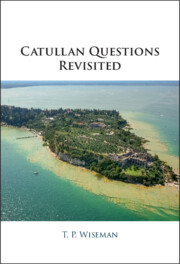5 results
Chapter 1 - Who Was Lesbia?
- from Part I
-
- Book:
- Catullan Questions Revisited
- Published online:
- 13 October 2022
- Print publication:
- 20 October 2022, pp 3-12
-
- Chapter
- Export citation

Catullan Questions Revisited
-
- Published online:
- 13 October 2022
- Print publication:
- 20 October 2022
Chapter 2 - ‘Shall I Compare Thee … ?’ Catullus 68B and the Limits of Analogy
-
- Book:
- Explorations in Latin Literature
- Published online:
- 05 August 2021
- Print publication:
- 19 August 2021, pp 37-51
-
- Chapter
- Export citation
Catullus’ Fantastical Memories – Poem 68 and Writing Trauma
-
- Journal:
- Antichthon / Volume 55 / 2021
- Published online by Cambridge University Press:
- 11 February 2022, pp. 136-154
- Print publication:
- 2021
-
- Article
- Export citation
Chapter 2 - ‘For Truth and Faith in Her Is Laid Apart’
-
- Book:
- Latin Erotic Elegy and the Shaping of Sixteenth-Century English Love Poetry
- Published online:
- 19 August 2019
- Print publication:
- 29 August 2019, pp 63-91
-
- Chapter
- Export citation

